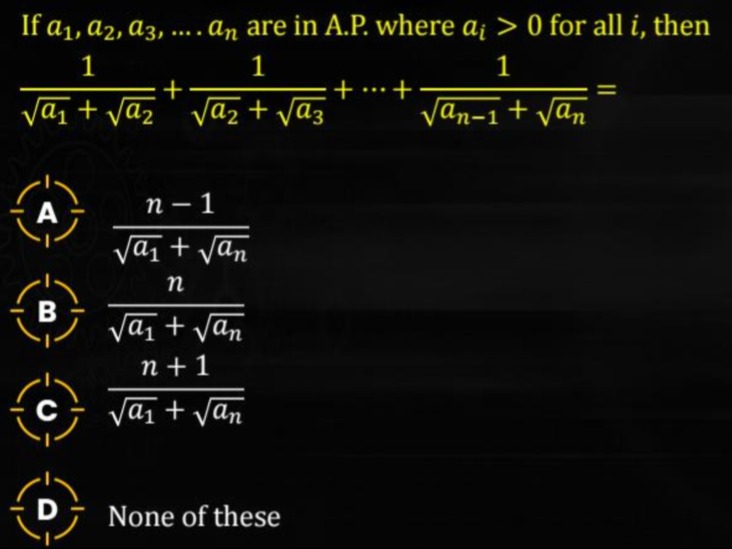Question
Question: If $a_1, a_2, a_3, .... a_n$ are in A.P. where $a_i > 0$ for all i, then $\frac{1}{\sqrt{a_1} + \sqr...
If a1,a2,a3,....an are in A.P. where ai>0 for all i, then a1+a21+a2+a31+…+an−1+an1=

a1+ann−1
a1+ann
a1+ann+1
None of these
a1+ann−1
Solution
Let the given sum be S. The general term of the sum is Tk=ak+ak+11. We rationalize the denominator of Tk: Tk=ak+ak+11×ak+1−akak+1−ak=ak+1−akak+1−ak Since a1,a2,...,an are in Arithmetic Progression (A.P.), the common difference is d=ak+1−ak for all k. So, Tk=dak+1−ak.
The sum S is given by: S=∑k=1n−1Tk=∑k=1n−1dak+1−ak=d1∑k=1n−1(ak+1−ak) This is a telescoping sum: ∑k=1n−1(ak+1−ak)=(a2−a1)+(a3−a2)+...+(an−an−1) =an−a1 Thus, S=dan−a1.
For an A.P., an=a1+(n−1)d. Therefore, the common difference d can be expressed as: d=n−1an−a1 Substitute this expression for d into the sum S: S=n−1an−a1an−a1=an−a1(n−1)(an−a1) We can factor the denominator an−a1 as a difference of squares: an−a1=(an−a1)(an+a1). S=(an−a1)(an+a1)(n−1)(an−a1) Assuming an=a1 (i.e. d=0), we can cancel the term (an−a1): S=an+a1n−1 The formula also holds when d=0. The condition ai>0 ensures that all square roots are real and positive, and the denominators are non-zero.
